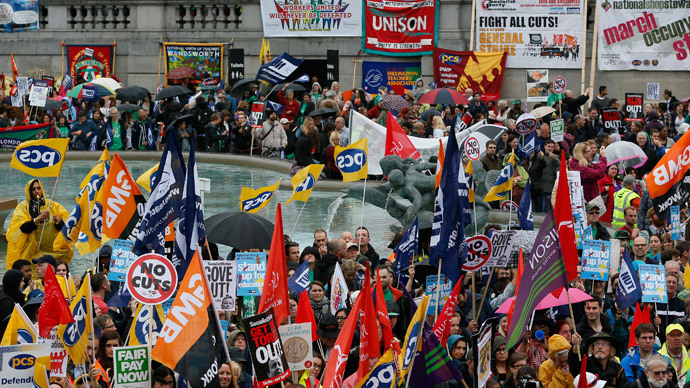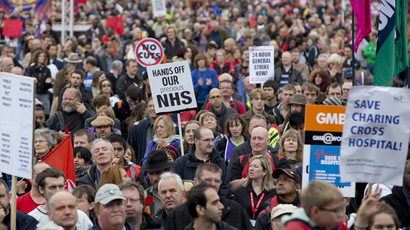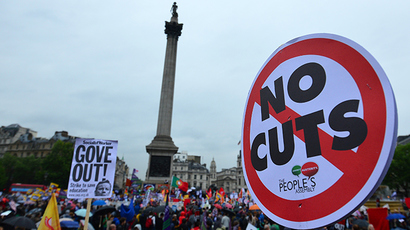24-hr public strike grips UK – 200,000 protest pay freeze

Striking public sector workers have caused widespread disruption to UK services including museums, courts and job centers, as a 24-hour national walk-out grips the nation.
Around 200,000 members of the Public and Commercial Services Union (PCS) are taking part in the nationwide action, held in response to ongoing pay freezes and government cuts to the public sector.
The union said many of its members have faced a 20 percent real terms pay cut since 2010, due to the government’s pay freeze and a 1 percent raise cap. It further claimed that low-paid public sector workers are forced to claim in-work benefits in order to make ends meet.
The strikes come as a study for the Institute of Policy Research notes a fall in real term wages since 2008, which means workers are now on average £5,000 a year worse off.
The PCS feels the government is using the pay freezes to bolster tax-cuts, and that they are “trying to slash public spending in order to pay for their millionaire friends.”
“We’re dealing with a lot of hardship cases. People are having real difficulties in getting through the month. We are just trying to attempt to avoid a pay cut,” Russell Carr, a PCS branch organizer, told RT on a picket line in London.

In a period where the government is praising the resurgence of the economy, strikers hope to highlight the discrepancies between rates of inflation and the effects of higher prices on real wages.
According to the New Economics Foundation, the real cost of living is lost within misleading inflation figures. The group’s Real Britain Index shows that the poorest 10 percent of Britons have faced a 15 percent decline in income over the past year.
James Meadway, senior economist at the NEF, said that it was clear that the Consumer Price Inflation measures “are no longer fit for purpose.” He believes that the statistics are “failing to match up to the reality of sliding living standards for the majority of Britons.”
Euston PCS branch with London ACAS picket line joining the action on #Oct15@pcs_unionpic.twitter.com/xuwkY45oNj
— pcs_euston (@pcs_euston) October 15, 2014
Carr said that the high cost of living was a problem faced by many members of the PCS. “I’m having difficulties. I’m on £19,000 and my wife works as well, our joint income is something like £38,000, but we can’t get through the month. We use credit cards, we use loans. It’s difficult for all of us,” Carr told RT.
The fall in wages has contributed to falling rates of unemployment. “Falling unemployment alone will not re-start sustained wage growth,” one striker told RT.
The Cabinet Office has issued a reaction to the strikes, calling PCS leaders “irresponsible.”
“The vast majority of dedicated public sector workers did not vote for today’s action,” the government said, condemning the mandate behind the strikes as “weak and outdated.” They have assured doors will be open at most job centers.
"90% of staff didn't cross the picket line and go to work at the Jobcentre." @pcs_union@boycottworkfare#strikeuppic.twitter.com/Ew7EyzpCPz
— Matt Cole (@FutureNoFutures) October 15, 2014
PCS Department for Work and Pensions (DWP) President, Fran Heathcote, told RT she is striking because PCS members “have had enough of low pay.”
“This is the seventh year of a freeze, or below inflation increase, for DWP workers, 40 percent of whom are now claiming working family tax credits and other low income benefits they are employed to administer,” said Heathcote.
“Enough is enough, the government won't negotiate with us so we must take action as we really do all need a pay rise.”
Speaking to RT, PCS Branch Secretary for East Kent David Semple said there is also a growing problem in the private sector, where, when faced with a pay rise, companies cut down on non-contracted hours. “Unions must unite - public sector and private sector - to strike back against the money-grubbing bosses,” said Semple.













